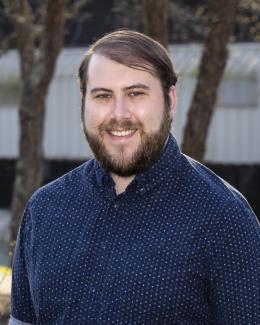July 18, 2016 – When Oak Ridge National Laboratory researcher Mike Brady began his freshman year at Virginia Tech, he’d never heard of materials sciences. Now he’s a fellow of ASM International, the largest and most prestigious association of metals-centric materials scientists in the world.
A native of Massachusetts, Brady moved to Virginia with the ambition of becoming an aerospace engineer. However, he soon found that he did not have the drafting skills needed for that field at the time.
Luckily, Virginia Tech was home to a host of material corrosion experts, and Brady “fell into” the field, as he tells it, studying low-temperature aqueous corrosion until graduate school, when he transitioned to the high-temperature corrosion research he performs today at the Department of Energy national laboratory.
Brady, a distinguished R&D staff member in ORNL's Materials Science and Technology Division, was recently honored by ASM International “for innovative development of novel alloy design principles for the control of surface chemistry in structural and functional materials with widespread scientific, engineering and societal impact.”
Brady’s decades of research in corrosion science, alloying and functional surface engineering have been applied in a number of areas, from biofuel production and hydrogen fuel cells to automotive parts and cook stoves.
“ASM was my first professional society. I joined as a student and have been a member for more than 25 years,” Brady said. “For me, being named an ASM Fellow is a major career milestone and is really a reflection of the great opportunities at ORNL to pursue relevant and impactful research, especially in collaboration with so many high-skilled colleagues.”
The ASM Fellowship is the latest in a long list of accomplishments throughout Brady’s research career. In 2015 alone, Mike won the ORNL Inventor of the Year Award, the TMS Brimacombe Medalist Award, the Materials Performance Corrosion Innovation of the Year Award in the Materials Design category and was a team member on studies that won Best Paper awards from the Journal of Nuclear Materials and the ASME Turbo Expo.
He also led the ORNL team that developed alumina-forming austenitic stainless steel, an innovative alloy family that won a 2009 R&D 100 Award. Brady continues to work with this alloy as part of a recently awarded ARPA-E project led by Govindarajan Muralidharan.
Brady earned his bachelor’s and master’s degrees from Virginia Tech and his doctorate from the University of Florida. He is an author on more than 100 journal and conference publications and has 15 issued US patents, with four more patents pending. In addition to ASM International, Brady is also a member of The Minerals, Metals and Materials Society and the National Association of Corrosion Engineers International.
Brady is especially proud of his work done with Colorado State University and Envirofit International on low-cost biomass cook stoves for the developing world. Roughly half of the world’s population cooks with biomass on open fires, a largely inefficient method that releases hazardous pollutants responsible for millions of premature deaths every year. Brady’s work on the project found a low-cost alloy that could resist corrosion at high temperatures over a long period of time, providing an affordable, healthier and fuel-efficient cook stove model distributed worldwide by Envirofit.
“I think they have a million stoves in service now and we’ve come up with what we think are some next-generation alloys that could do even better at low cost,” Brady said.
The key to his work, he said, is not just research and publication, but the evaluation of his results on a commercial stage to test the possibilities of a new material and find out what can be done to make it better.
“I want the alloys and materials we come up with to be used,” Brady said. “It takes a long time. It may take 10 to 20 years in some cases, but I want the alloys to be used in hopefully cleaner, more efficient processes.”
Outside of the lab, Mike spends most of his time with his family. Brady’s two sons are avid math, science and chess fans and have attended competitions with their parents for years.
Brady also enjoys tennis and was a volunteer assistant coach for the Virginia Tech woman’s tennis team during graduate school. The sport has turned into a great family activity for him as he prepares his children to play for the Oak Ridge High School team.
UT-Battelle manages ORNL for the Department of Energy's Office of Science. The Office of Science is the single largest supporter of basic research in the physical sciences in the United States, and is working to address some of the most pressing challenges of our time. For more information, please visit http://energy.gov/science/.



